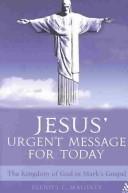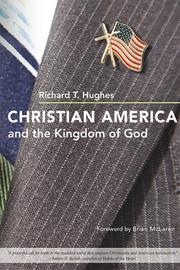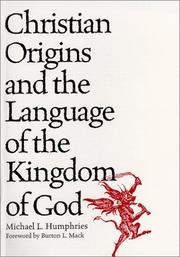| Listing 1 - 10 of 22 | << page >> |
Sort by
|
Book
Year: 1952 Publisher: [Place of publication not identified] Catholic University of America Press
Abstract | Keywords | Export | Availability | Bookmark
 Loading...
Loading...Choose an application
- Reference Manager
- EndNote
- RefWorks (Direct export to RefWorks)
Book
ISBN: 1684269075 0891121811 Year: 1989 Publisher: Abilene, TX : Abilene Christian University,
Abstract | Keywords | Export | Availability | Bookmark
 Loading...
Loading...Choose an application
- Reference Manager
- EndNote
- RefWorks (Direct export to RefWorks)
Kingdom of God. --- Kingdom of God --- Biblical teaching. --- God, Kingdom of --- Eschatology --- God (Christianity)

ISBN: 1441104240 9781441104243 0826416047 9780826416049 Year: 2004 Publisher: New York Continuum
Abstract | Keywords | Export | Availability | Bookmark
 Loading...
Loading...Choose an application
- Reference Manager
- EndNote
- RefWorks (Direct export to RefWorks)
The Kingdom of God is like an intergalactic starship in constant orbit around the earth. No on can see it, but its tremendous power is available at all times to anyone who is dedicated to its transcendent message. With this splendid metaphor, Maloney launches into an engaging study of the Gospel of Mark.He argues forcefully that the key theme of the book is eschatology (death and resurrection) and his argument goes against the grain of the majority of Markan scholars who contend that the themes of the Gospel are discipleship and the Messianic secret. Maloney asserts that Markan scholars have s
Kingdom of God --- Biblical teaching. --- Bible. --- Criticism, interpretation, etc.

ISBN: 1283044013 9786613044013 025209154X 9780252091544 9780252032851 0252032853 9781283044011 6613044016 0252078896 9780252078897 Year: 2009 Publisher: Urbana
Abstract | Keywords | Export | Availability | Bookmark
 Loading...
Loading...Choose an application
- Reference Manager
- EndNote
- RefWorks (Direct export to RefWorks)
Particularism (Theology) --- Kingdom of God --- Christianity and politics --- Election (Theology) --- God, Kingdom of --- Eschatology --- God (Christianity) --- Biblical teaching. --- Political aspects
Book
ISBN: 3161596714 Year: 2020 Publisher: Tubingen, Germany : Mohr Siebeck,
Abstract | Keywords | Export | Availability | Bookmark
 Loading...
Loading...Choose an application
- Reference Manager
- EndNote
- RefWorks (Direct export to RefWorks)
Hallur Mortensen analysiert den Gottesbegriff bei Markus, indem er die Verbindung der Taufe in 1,9–11 zum Kommen des Herrn, zum Evangelium und zum Reich Gottes in 1,2–3 und 1,14–15 betont. Die göttliche Stimme, die die Identität von Jesus und Gott offenbart, und der Geist werden im Kontext des jüdischen Monotheismus untersucht.
Trinity --- Biblical teaching. --- Jesus Christ --- Baptism. --- Bible. --- Criticism, interpretation, etc. --- Christology --- Holy Spirit --- kingdom of God --- gospel --- Neues Testament
Book
ISBN: 9781107463189 9780521199940 9781139014144 9781139568678 1139568671 0521199948 1139887858 1139579096 1139573144 1139014145 113957048X 1139572245 1283716232 1139569589 1107463181 Year: 2012 Publisher: New York Cambridge University Press
Abstract | Keywords | Export | Availability | Bookmark
 Loading...
Loading...Choose an application
- Reference Manager
- EndNote
- RefWorks (Direct export to RefWorks)
Augustine's City of God has profoundly influenced the course of Western political philosophy, but there are few guides to its labyrinthine argumentation that hold together the delicate interplay of religion and philosophy in Augustine's thought. The essays in this volume offer a rich examination of those themes, using the central, contested distinction between a heavenly city on earthly pilgrimage and an earthly city bound for perdition to elaborate aspects of Augustine's political and moral vision. Topics discussed include Augustine's notion of the secular, his critique of pagan virtue, his departure from classical eudaimonism, his mythology of sin, his dystopian politics, his surprising attention to female bodies, his moral psychology, his valorisation of love, his critique of empire and his conception of a Christian philosophy. Together the essays advance our understanding of Augustine's most influential work and provide a rich overview of Augustinian political theology and its philosophical implications.
Kingdom of God --- Apologetics --- Augustine, --- 276 =71 AUGUSTINUS --- God, Kingdom of --- Latijnse patrologie--AUGUSTINUS --- Royaume de Dieu --- Kingdom of God. --- Apologetics. --- Augustin, --- Eschatology --- God (Christianity) --- Apologetics, Missionary --- Christian evidences --- Christianity --- Evidences, Christian --- Evidences of Christianity --- Fundamental theology --- Polemics (Theology) --- Theology, Fundamental --- Religious thought --- Theology --- Evidences --- Royaume de Dieu. --- Arts and Humanities --- Philosophy --- Augustine, - of Hippo, Saint, - 354-430. - De civitate Dei

ISBN: 0585112495 9780585112497 0809322307 9780809322305 Year: 1999 Publisher: Carbondale, Ill.
Abstract | Keywords | Export | Availability | Bookmark
 Loading...
Loading...Choose an application
- Reference Manager
- EndNote
- RefWorks (Direct export to RefWorks)
Q hypothesis (Synoptics criticism) --- Christianity --- Kingdom of God. --- Devil. --- Kingdom of God --- Devil --- Religion --- Philosophy & Religion --- Beelzebub --- Beelzebul --- Lucifer --- Satan --- Satanael --- Satanail --- Demonology --- God, Kingdom of --- Eschatology --- God (Christianity) --- Religions --- Church history --- Logia source (Synoptics criticism) --- Q document (Synoptics criticism) --- Sayings source (Synoptics criticism) --- Synoptic problem --- Two source hypothesis (Synoptics criticism) --- Church --- Origin. --- Origin --- Foundation --- Bible. --- Criticism, interpretation, etc. --- Christianity.
Book
ISBN: 9780813540979 0813540976 9780813536637 0813536634 9780813536644 0813536642 Year: 2005 Publisher: New Brunswick Rutgers University Press
Abstract | Keywords | Export | Availability | Bookmark
 Loading...
Loading...Choose an application
- Reference Manager
- EndNote
- RefWorks (Direct export to RefWorks)
Denounced by some as a dangerous cult and lauded by others as a miraculous faith community, the International Churches of Christ was a conservative evangelical Christian movement that grew rapidly in the 1980s and 1990s. Among its followers, promises to heal family relationships were central to the group's appeal. Members credit the church for helping them develop so-called "awesome families"-successful marriages and satisfying relationships with children, family of origin, and new church "brothers and sisters." The church engaged an elaborate array of services, including round-the-clock counseling, childcare, and Christian dating networks-all of which were said to lead to fulfilling relationships and exciting sex lives. Before the unified movement's demise in 2003-2004, the lure of blissful family-life led more than 100,000 individuals worldwide to be baptized into the church. In Awesome Families, Kathleen Jenkins draws on four years of ethnographic research to explain how and why so many individuals-primarily from middle- to upper-middle-class backgrounds-were attracted to this religious group that was founded on principles of enforced community, explicit authoritative relationships, and therapeutic ideals. Weaving classical and contemporary social theory, she argues that members were commonly attracted to the structure and practice of family relationships advocated by the church, especially in the context of contemporary society where gender roles and family responsibilities are often ambiguous. Tracing the rise and fall of this fast-growing religious movement, this timely study adds to our understanding of modern society and offers insight to the difficulties that revivalist movements have in sustaining growth.
Christian sociology --- International Churches of Christ. --- Sociology --- Disciple (Christianity) --- Evangelicalism --- Family (biology) --- God --- the International Churches of Christ --- healing relationships --- therapeutic religious movements --- alternative religions --- conservative Evangelical Christian movement --- the Kingdom of God
Multi
ISBN: 9783110372571 3110372576 9783110332568 3110332566 9783110332438 3110332434 1306430186 Year: 2014 Publisher: Berlin/Boston
Abstract | Keywords | Export | Availability | Bookmark
 Loading...
Loading...Choose an application
- Reference Manager
- EndNote
- RefWorks (Direct export to RefWorks)
Die Vorstellung vom Reich Gottes ist in der Theologie des 19. Jahrhunderts eine allseits präsente, in der Forschungsliteratur gleichwohl nur marginal beachtete. Die vorliegende Untersuchung widmet sich diesem Leitmotiv der Theologie des 19. Jahrhunderts wie auch seinen gesellschaftlichen und sozialpolitischen Verflechtungen. Zu diesem Zweck wird das Oeuvre dreier Theologen exemplarisch herangezogen, nämlich dasjenige Isaak August Dorners (1809-1884), Johann Tobias Becks (1804-1878) sowie Franz Theremins (1780-1846), der - heute nahezu in Vergessenheit geraten - in seiner Zeit als Prediger wie auch als Schriftsteller stark rezipiert wurde. In den Einzelanalysen wird deutlich, dass der Reich-Gottes-Begriff der jeweils entscheidende Bezugspunkt dieser sehr verschiedenen theologischen Ansätze ist; ihm kommt eine prinzipientheologische Funktion zu.Zugleich zeigt die Untersuchung auf, dass es über die Vorstellung vom Reich Gottes gelingt, christliche Theologie und Kultur der Zeit in Zusammenhang zu bringen. Der Reich-Gottes-Begriff dient also einer Hermeneutik der Kultur und ist gleichermaßen selbst der Zentralbegriff einer Kulturtheologie.
230.24 "18" --- 230.24 "18" Protestantse systematische theologie--19e eeuw. Periode 1800-1899 --- Protestantse systematische theologie--19e eeuw. Periode 1800-1899 --- Kingdom of God --- God, Kingdom of --- Eschatology --- God (Christianity) --- History of doctrines --- Theremin, Franz, --- Dorner, I. A. --- Beck, J. T. --- Beck, Johann Tobias, --- Dorner, Isaak August, --- Dorner, J. A., --- 19th century-theology. --- Franz Theremin. --- Isaak August Dorner. --- Johann Tobias Beck. --- Kingdom of God.
Book
ISBN: 0567667227 0567667219 9780567667212 9780567669681 0567669688 9780567667205 0567667200 9780567667229 Year: 2016 Volume: 555 Publisher: New York
Abstract | Keywords | Export | Availability | Bookmark
 Loading...
Loading...Choose an application
- Reference Manager
- EndNote
- RefWorks (Direct export to RefWorks)
Little attention is usually given to the space or place of the kingdom. Yet Matthew employs the distinctive phrase "kingdom of heaven" and also portrays Jesus as Immanuel (God with us). In this volume Patrick Schreiner argues that by expanding one's view of space one can see that Jesus' purpose is to reorder the space of the earth in Matthew as the heavenly king. Jesus pierces the barrier between the two realms in his incarnation, and the spaces of heaven and earth begin to collide in his ministry. Therefore, in Matthew, Jesus does not just promise a temporal or ethereal kingdom, but one that is located, one that has a sense of rootedness. Jesus is granted authority over this space and inspires people to follow him in this construction project. The spatial kingdom begins in his body, and he extends it to his church by promising his presence
Kingdom of God --- Space --- Human geography. --- Anthropo-geography --- Anthropogeography --- Geographical distribution of humans --- Social geography --- Anthropology --- Geography --- Human ecology --- Biblical teaching. --- Religious aspects --- Christianity. --- Bible. --- Evangelie volgens Matteus --- Evangelie volgens Matthéüs --- Matʻae pogŭm --- Matai den --- Matai ni yoru fukuinsho --- Matius (Book of the New Testament) --- Mattá --- Matteo (Book of the New Testament) --- Matteus --- Matthäusevangelium --- Matthéüs --- Matthew (Book of the New Testament) --- Matthieu (Book of the New Testament) --- Criticism, interpretation, etc. --- Bible --- Criticism, interpretation, etc --- Kingdom of God - Biblical teaching. --- Space - Religious aspects - Christianity.
| Listing 1 - 10 of 22 | << page >> |
Sort by
|

 Search
Search Feedback
Feedback About UniCat
About UniCat  Help
Help News
News